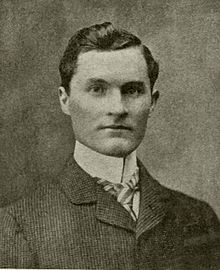Caleb Powers
Caleb Powers | |
|---|---|
 | |
| Member of the U.S. House of Representatives from Kentucky's 11th district | |
| In office March 4, 1911 – March 3, 1919 | |
| Preceded by | Don C. Edwards |
| Succeeded by | John M. Robsion |
| 55th Secretary of State of Kentucky | |
| In office December 12, 1899 – January 31, 1900 | |
| Governor | William S. Taylor |
| Preceded by | Charles Finley |
| Succeeded by | |
| Personal details | |
| Born | February 1, 1869 Whitley County, Kentucky |
| Died | July 25, 1932 (aged 63) Baltimore, Maryland |
| Political party | Republican |
| Alma mater | Valparaiso University |
| Profession | Lawyer |
Caleb Powers (February 1, 1869 – July 25, 1932) was a United States Representative from Kentucky and the first Secretary of State of Kentucky convicted as an accessory to murder.
Early life[]
He was born near Williamsburg, Kentucky. He attended the public schools, Union College in Barbourville, Kentucky, the University of Kentucky at Lexington, Kentucky and Centre College in Danville, Kentucky. He graduated from the Northern Indiana Normal School and Business Institute (now known as Valparaiso University) in Valparaiso, Indiana and attended the United States Military Academy in 1890 and 1891.
Powers studied law and was admitted to the bar in 1894 and commenced practice at Barbourville, Kentucky. He was the superintendent of public schools for Knox County, Kentucky 1894-1899. He was elected secretary of state of Kentucky in 1899 but was unseated after a contest.
Assassination of William Goebel[]
Powers was convicted of complicity in the assassination of Governor William Goebel in 1900. The prosecution charged that Powers was the mastermind, having a political opponent killed so that his boss, Governor William S. Taylor, could stay in office. Among his attorneys were R. C. O. Benjamin and Frank S. Black. He was sentenced to prison. An appeals court overturned Powers' conviction, though Powers was tried three more times, resulting in two convictions and a hung jury. Governor Augustus E. Willson pardoned Powers in 1908. Powers had served eight years in jail. While in prison, Powers authored the 1905 book My Own Story.
Congress and later life[]
After leaving prison, Powers was elected as a Republican to the 62nd and to the three succeeding Congresses (March 4, 1911 – March 3, 1919) but was not a candidate for renomination in 1918. He served as a delegate to the Republican National Convention in 1912 and moved to Washington, D.C., and served as assistant counsel for the United States Shipping Board from 1921 until his death in Baltimore, Maryland, in 1932. He was buried in City Cemetery, Barbourville, Kentucky.
Caleb Powers married Laura Rawlings in January 1896 and she died six months later. He was survived by his second wife, Dorothy. He had one daughter, named Elsie.
See also[]
References[]
- United States Congress. "Caleb Powers (id: P000487)". Biographical Directory of the United States Congress.
- Secretary of State Caleb Powers - From the Secretary of State of Kentucky.
- Elliot, R. Assassination at the State House: The Unsolved Mystery of Kentucky's Governor Goebel. McClanahan Publishing House, 1995.
- [1] Aggregated Citations
- [2] Collected Papers
- [3] News article of death
- [4] "COMMONWEALTH OF KENTUCKY v. CALEB POWERS. IN THE MATTER OF THE COMMONWEALTH OF KENTUCKY, COMMONWEALTH OF KENTUCKY"
- [5] GovTrack.us
External links[]
- Caleb Powers at Find a Grave
- Caleb Powers papers at the University of Kentucky Libraries Special Collections Research Center
| show |
|---|
- 1869 births
- 1932 deaths
- Members of the United States House of Representatives from Kentucky
- People from Whitley County, Kentucky
- Centre College alumni
- Valparaiso University alumni
- Recipients of American gubernatorial pardons
- Secretaries of State of Kentucky
- Kentucky Republicans
- Kentucky politicians convicted of crimes
- Overturned convictions in the United States
- Republican Party members of the United States House of Representatives